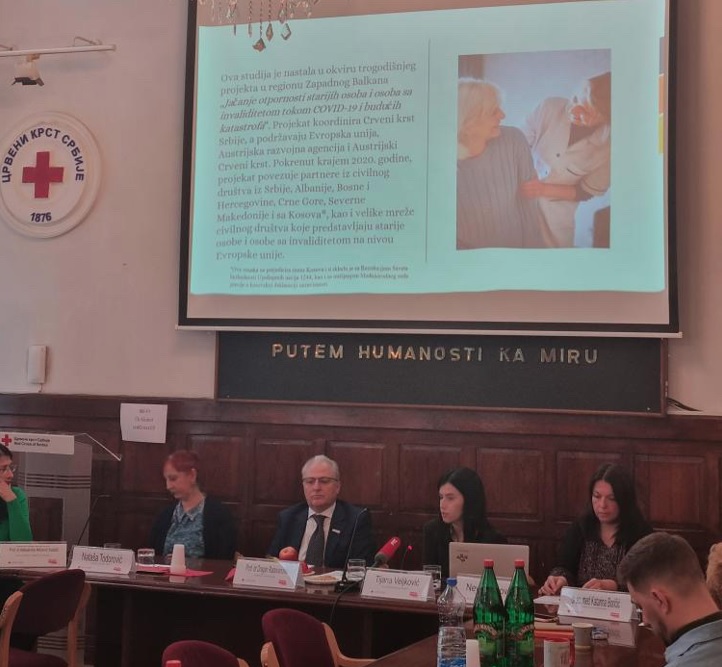The SeConS Development Initiative Group was one of the participants in the “Health for All” conference, organized at the Serbian Red Cross headquarters to mark World Health Day.
Participants at the conference noted that a major challenge faced worldwide is the fact that one-third of the world’s population currently has no access to basic health services.
Participants presenting at the conference were Prof. Dragan Radovanović, PhD, President of the Red Cross of Serbia; Brankica Janković, Commissioner for the Protection of Equality; Nevena Šović from the United Nations Population Fund; Nataša Todorović from the Red Cross of Serbia; Tijana Veljković from SeConS; Katarina Boričić, MD, PhD, from the Institute of Public Health of Serbia “Dr. Milan Jovanović Batut”; and Prof. Aleksandra Milićević Kalašić, PhD, from the Faculty of Media and Communications.
They concurred that healthy lifestyles and health promotion should be vigorously supported, and health policy consistently improved, given that the right to health is a fundamental human right. It was emphasized that every individual must have access to necessary health services when and where needed, that the quality of the service should be appropriate, and that the service should not only be physically accessible but also financially available.
President of the Red Cross of Serbia, Dragan Radovanović, declared that this organization is committed to health and prevention activities. According to him, the Red Cross of Serbia held 2,147 workshops last year, promoting healthy lifestyles as part of these activities. These workshops included more than twenty thousand children under the age of 14, more than eleven thousand young people under the age of 30, more than seven thousand adults aged 30 to 64, and more than three thousand adults over the age of 65.
The Commissioner for the Protection of Equality, Brankica Janković, said that public policy creators should rapidly change the health care system to fit the demographic structure, since the latter will not be changing anytime soon. She highlighted the importance of elderly citizens getting more involved and having easier access to necessary healthcare. Prof. Milićević Kalašić stressed the significance of mental wellbeing as integral to health.
This year’s World Health Day conference, hosted by the Red Cross of Serbia, was an ideal opportunity to talk more about the health of the elderly as the fastest growing demographic group, both in our country and in the world. Katarina Boričić presented the results of the population health research, according to which almost a third of the elderly population in Serbia (approximately 40%) rated their own health as very good and good, while approximately 27% of respondents rated their health as bad and very bad. The finding represents a shift in the positive direction compared to 2013 when more than 22% of the elderly population rated their health as good and very good.
Tijana Veljković from the SeConS Development Initiative Group presented the research that was jointly conducted by the Red Cross of Serbia and SeConS as part of the regional project “Strengthening resilience of older persons and persons with disabilities during COVID-19 and future disasters”, funded by the European Union and the Austrian Development Agency and coordinated in the region by the Red Cross of Serbia. This research shows that the majority of the elderly and persons with disabilities are satisfied with the quality of health and social care services provided in the community, but that they need more services to be available. She also emphasized the necessity of closer coordination of the provision of social and health care services.
Nataša Todorović discussed the importance of Universal health coverage as the foundation of the “Health for All” concept, chosen as the topic for this year’s World Health Day. She also reminded that access to quality health and care services throughout life is essential to support healthy aging for all.
This year, April 7 marks the 75th anniversary of the founding of World Health Organization. In 1948, countries of the world came together to establish WHO to promote health, keep the world safe and serve the vulnerable – so that everyone, everywhere can attain the highest level of health and well-being.

